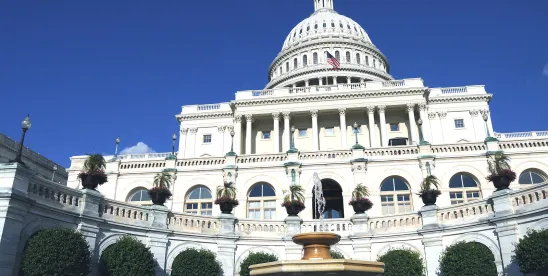Introduction
On June 28th, in Loper Bright Enterprises v. Raimondo, the U.S. Supreme Court overturned the Chevron Doctrine. The 6-3 decision was anticipated. But its breadth marks the Court’s opinion as a modern-day Marbury v. Madison. The common interpretation is that the decision moved power from the Executive Branch to the Courts. But there is another power dynamic that has not been sufficiently covered, and that is in the United States Congress. The big question is how Congress might respond and what this means for companies?
Congress Reacts to Loper
Congress often enacts legislative limitations and prohibitions in statutes to prevent departments and agencies from taking certain actions or activities. Prior to 1983, Congress included legislative language enabling the approval or disapproval of executive decisions. This was accomplished through legislative vetoes: one-house veto, two-house vetoes, and committee vetoes. These legislative actions were not submitted to the President for his signature or veto.
In 1983, the U.S. Supreme Court, in INS v. Chadha, struck down the legislative veto. The Court ruled that whenever Congress seeks to directly affect agency or department actions, it must act by passing legislation in both Houses and submittal to the President. The decision affected over 200 laws.
The congressional reaction was both institutional, bipartisan, and highly negative, as Members resented the Court taking away a 50-year legislative tool. As the Congressional Research Service noted, the decision resulted in pushing some legislative vetoes “underground, where they operate on the basis of informal and non-statutory understandings.” Appropriation bills also became vehicles containing language such as “no funds may be used to…” to prevent agency actions or legislative language directing certain actions.
Ultimately, in 1996, Congress passed the Congressional Review Act, which provides Congress a process to disapprove final rules, major and nonmajor rules, and interim rules. The law provides for an expedited process in both Houses, with no filibuster in the Senate.
But the reaction from Loper has been decidedly different. Reaction has been partisan as follows:
- Speaker Mike Johnson [R-LA] and Majority Leader Steve Scalise [R-LA] issued a joint statement calling Loper a landmark decision and the beginning of the end of the administrative state.
- House Democratic Leader Hakeem Jefferies [D-NY] released a statement saying, “Overturning Chevron will make it harder for public agencies to protect hardworking American taxpayers.”
- Senate Majority Whip Dick Durbin [D-IL] criticized the decision, saying the “Court’s conservative majority just shamelessly gutted long-standing precedent in a move that will embolden judicial activism and undermine important regulations.”
- House Energy and Commerce Committee Chair Cathy McMorris Rodgers [R-WA] stated that in the future, “major decision-making authority will no longer automatically be deferred to unelected, unaccountable bureaucrats.” Meanwhile, the Ranking Member, Frank Pallone [D-NJ], called the decision “a naked power grab by a radical, right-wing Supreme Court that has proven dismissive of precedent and divorced from reality.”
- Other statements in support of the decision were issued by the chairs of the House Committees on Agriculture and Judiciary.
In short, there was not unified bipartisan reaction to the Loper decision.
Congress has also responded by exercising its oversight powers as members and committees begin to assert themselves. For example, Senator Bill Cassidy, MD [R-LA], Ranking Member of the Committee on Health, Education, Labor, and Pensions (HELP), sent a series of letters to the Departments of Health and Human Services, Education, and Labor, as well as the Food and Drug Administration, National Labor Relations Board, Equal Employment Opportunity Commission, and the Employee Benefits Security Administration. The letters generally asked the following:
- Would a Department or Agency conduct a systematic review of its ongoing activities to identify necessary regulatory changes to comply with the Court’s decision?
- Would a Department or Agency pause or halt any existing rulemaking activities? If so, what rules would be halted?
- How will Congress be involved in policy issues under the Department’s purview?
- Questions about timely responses to Congressional inquiries and future regulatory briefings, training and seminars planned.
Senator Eric Schmitt [R-MO] is leading an effort with 18 other Republican Senators to “reclaim legislative power and navigate a post-Chevron world.” He has introduced the “Separation of Powers Restoration Act (SOPRA), which would place a de novo standard of review under the Administrative Procedure Act, which would have courts weigh the merits of an argument without a deference standard to either side.”
Rep. James Comer [R-KY], Chairman, Committee on Oversight and Accountability, sent letters to three agencies. He also cosigned letters with other House committee chairs to 26 departments and agencies. All of the letters cited the Loper decision and requested information on any review of current and proposed regulations.
Rep. Virginia Foxx [R-NC], Chair, Committee on Education and the Workforce, sent eight letters to departments and agencies under the jurisdiction of her committee, calling on them to adhere to the Loper decision. Chair Foxx asked for information concerning agency adjudications initiated or completed and rules proposed since January 20, 2021, the beginning of the Biden Administration.
The other congressional reaction has occurred in the appropriations process. The House Appropriations Committee has reported FY 2025 appropriation bills with restrictive legislative language concerning current and proposed regulations.
Meanwhile, Rep. August Pfluger [R-TX], along with 10 cosponsors, introduced H.R. 8928, the “Returning Power to the People Act of 2024." The bill would limit regulatory authority of departments and agencies to regulations explicitly delegated by Congress. These agencies would be expressly prohibited from issuing civil penalties for violating federal action that does not fall under congressional liability standards under the appropriate underlying statute. The legislation also authorizes private rights of action.
Congressional Institutional Power Shift
Over the last thirty years, power shifted in both Houses of Congress from committees to leadership. The committee might begin the legislative process; the majority leadership, regardless of party, would rewrite legislation based on politics as well as policy.
According to recent academic literature, Senate leadership routinely bypassed committees. For example, the Affordable Care Act, initially drafted through a two-committee process, was rewritten in the office of then Majority Leader Harry Reid [D-NV]. This led to some drafting errors, legislative ambiguities, and the loss of key provisions, in particular a severance clause. The need for detailed, precise legislation will make this type of action more difficult to produce a bill, and ultimately, a law, that can survive the judicial process.
In another example of legislative drafting ambiguity, in Snyder v. United States, the Court recently overturned the conviction of a former mayor of Portage, Indiana, for accepting bribes. The mayor received gratuities after awarding two contracts to a local trucking company. He was indicted and convicted under Dodd-Frank, which defined bribes but was unclear about gratuities after the contract awards.
Key elements in many laws have been enacted as a result of political compromise. Nothing is wrong with political compromise unless the outcome results in vague legislative textual language. Executive Branch departments and agencies were left to interpret Congressional intent. Not anymore.
There have been other instances of laws enacted that were simply too vague with regard to executive branch authority. The 340B Discount Drug Program is under the administrative jurisdiction of the Health Resources and Services Administration (HRSA). However, the statute is so poorly drafted that HRSA is unable to adequately oversee and administer the law. Each attempt by the agency to bring order to the program has been overruled by the Judiciary—and this is pre-Loper.
The Supreme Court’s decision means going forward, Congressional committees will need to write detailed legislation that makes clear the legislative intent.
Legislation will become more comprehensive and longer. Many worry that Congress may not be staffed for this type of detailed legislative drafting.
The Lobbyists
After Congressional committees, the next beneficiaries are policy advocates.
Lobbyists have both the legislative and policy expertise that Congress lacks but will certainly need in the short term and likely over a longer period of time.
Recall that during the George W. Bush Administration, Vice President Dick Cheney had responsibility for dealing with energy legislation. He invited lobbyists from energy companies to the White House, and they wrote detailed legislation. The public reaction was negative, but the point is there may well be more of this both in Congress and the White House, regardless of party. Outside advocates are the ones most familiar with statutes in their areas of concern and will be most likely to be able to draft the detailed legislation necessary.
Forty-two trade groups signed a letter to President Biden asking him to “pause all current rulemakings and stop new rules from taking effect until there is a thorough legal review of each agency’s constitutional and statutory authority to regulate in the way it proposes.” Signatories included the American Chemistry Council, the Associated General Contractors of America, the National Federation of Independent Business and the National Grocers Association.
Finally, if the outcome of the 2024 elections results in Republicans holding the House and capturing the Senate, look for oversight hearings on regulations spanning the entire Federal government. Trade groups and lobbyists across the political and policy spectrum already have lists of regulations they would like to see repealed or amended. Lobbyists are the people best positioned to work with Congress concerning oversight and legislative drafting.
Whether representing particular organizations, associations, trade groups, corporations, or contract lobbyists, Congress will be reliant on these policy experts who know both the issues and have the necessary drafting expertise. Stay tuned.




 />i
/>i
